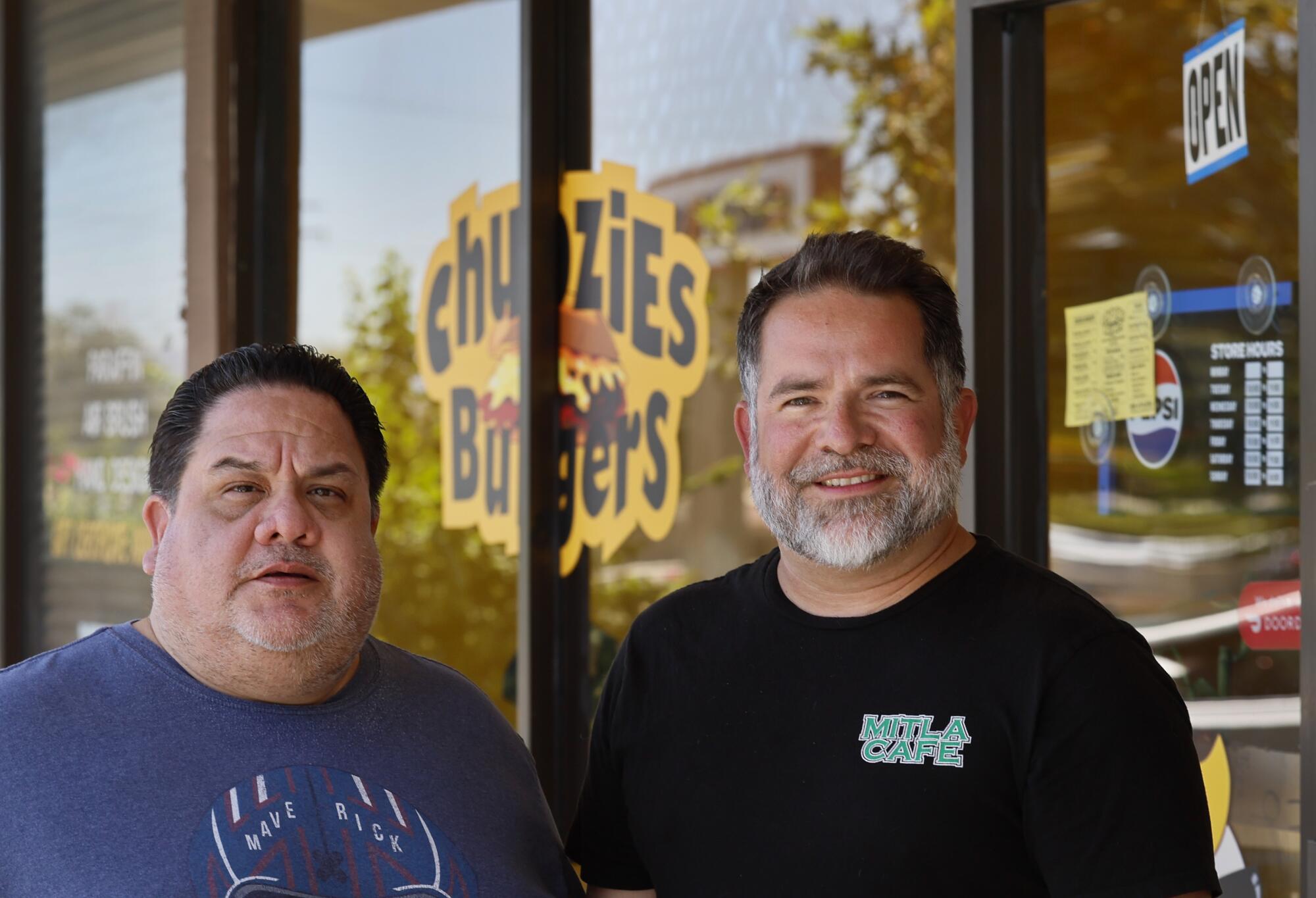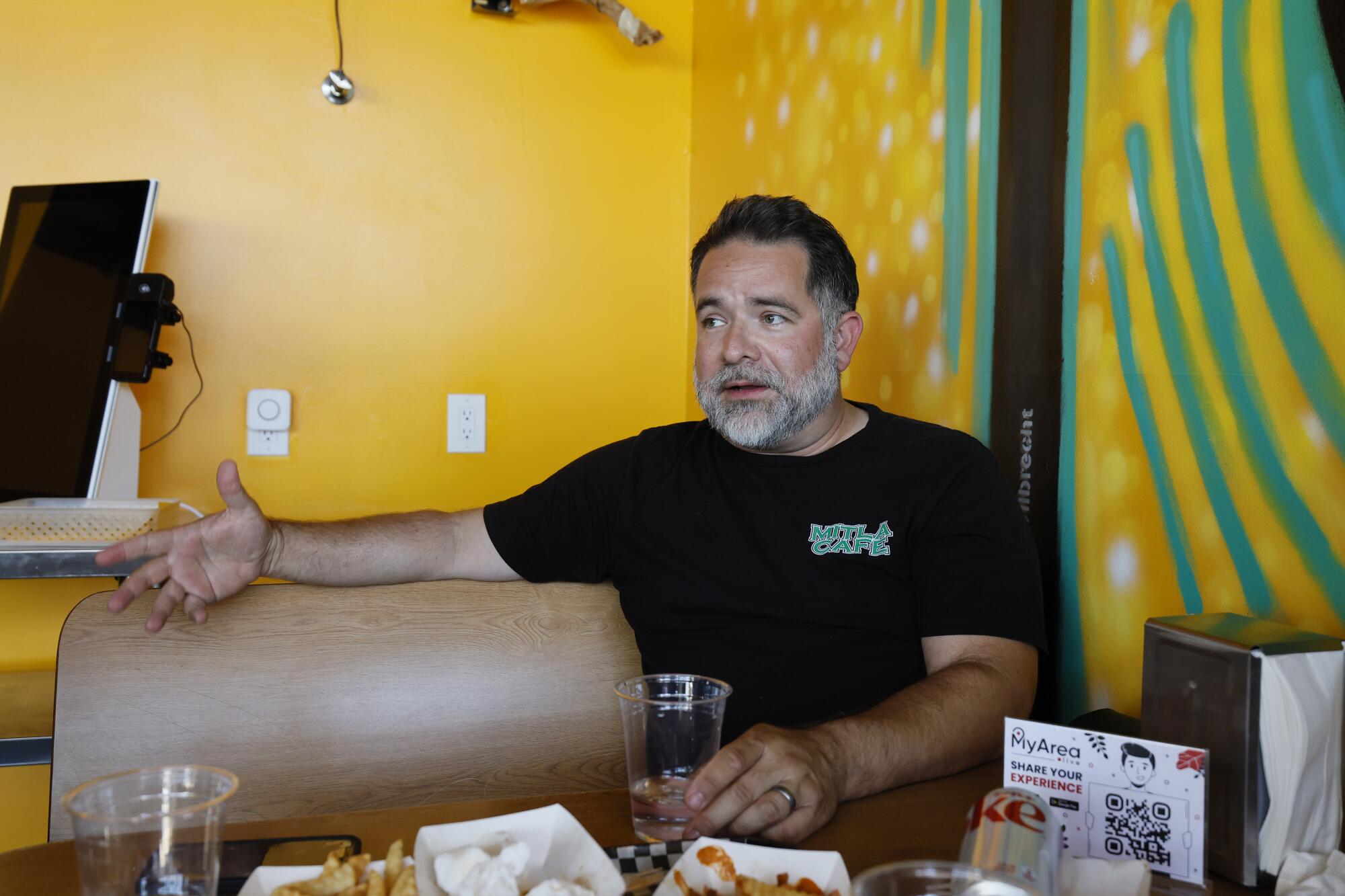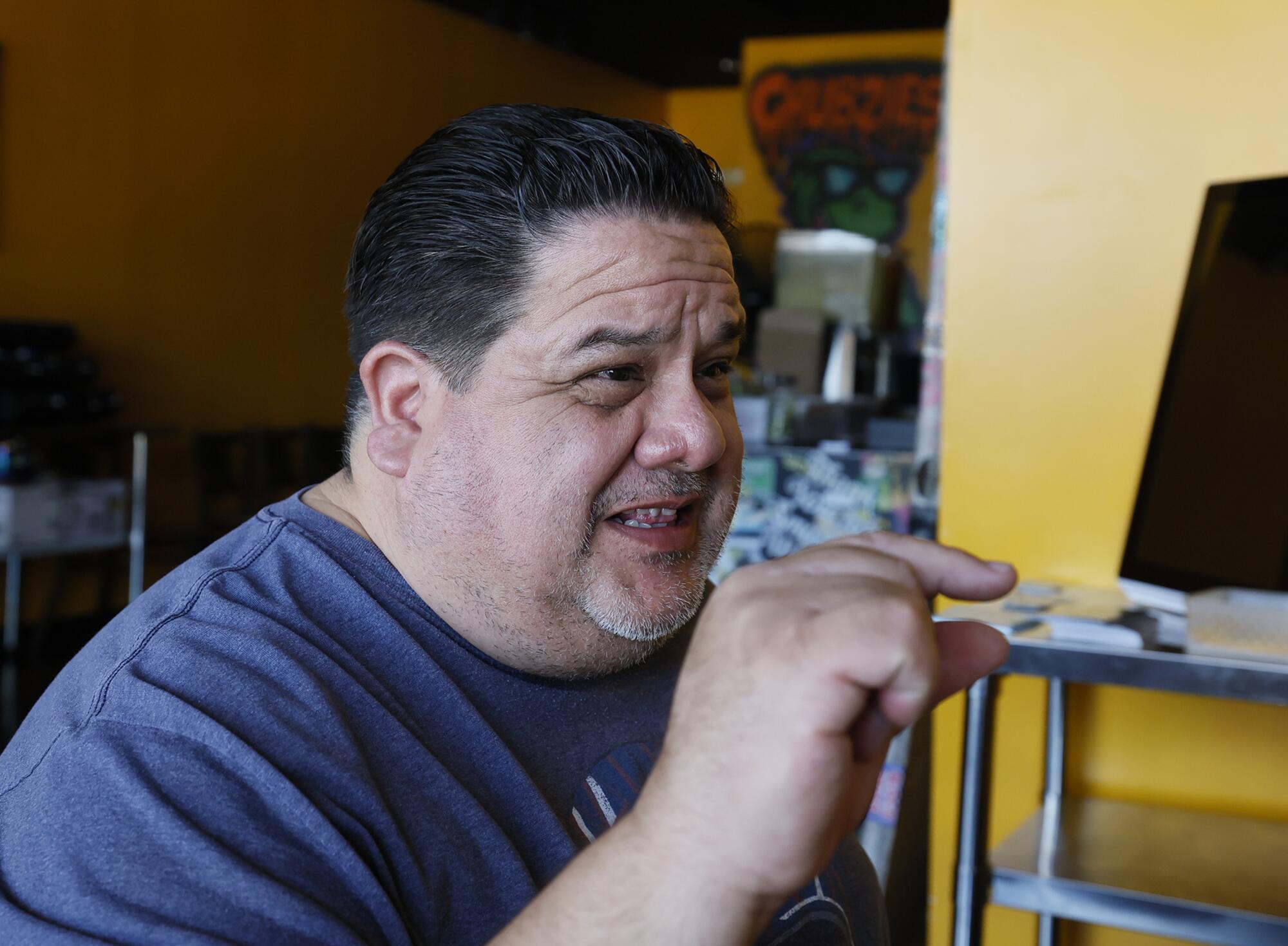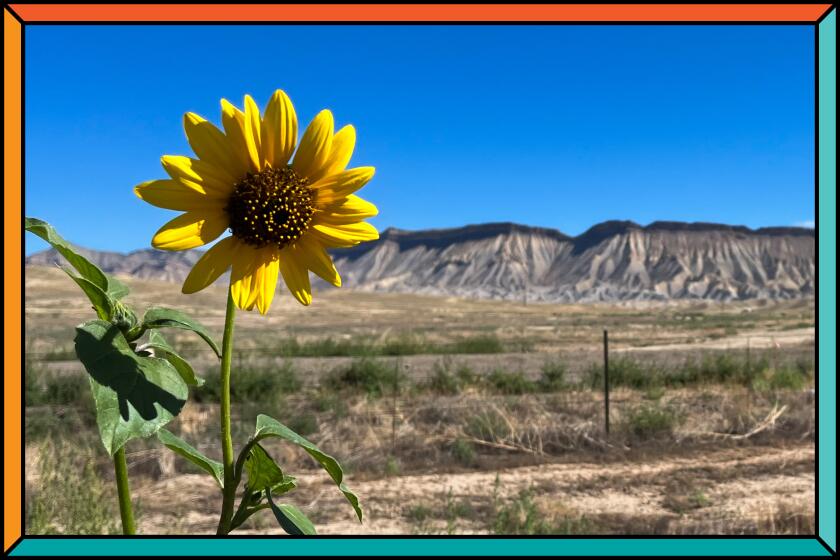
- Share via
I left Las Vegas for home on a Tuesday morning, tired and optimistic after nearly a week on the road. I took so many notes talking to Latinos about their hopes and fears in this election year that I filled up my legal pad. So many quotes, so many anecdotes — and there was one more, delicious stop left.
For 87 years, Mitla Cafe in San Bernardino has served Cal-Mex classics such as chile colorado and huevos rancheros. It is best known for its hard-shell tacos: ground beef mixed with mashed potatoes, topped with a blizzard of orange cheese, green lettuce and red tomatoes, held together by a freshly fried shell that shines like an ingot.
Seven days. Seven states. Nearly 3,000 miles. Gustavo Arellano talks to Latinos across the Southwest about their hopes, fears and dreams in this election year.
The restaurant is on the old Route 66, and travelers regularly stopped by to eat and rest in the comfy booths before the final stretch to Los Angeles.
Glen Bell, a World War II veteran who opened a hamburger stand across the street in the early 1950s, would eat at Mitla in the evenings, then go back to his own spot and try to reverse engineer those delicious tacos.
Mitla’s owners eventually wised up and invited him to learn how to properly prepare them.
Bell eventually lost his hamburger stand in a divorce — but not his dream to become a millionaire off Mexican food. He opened a string of taco chains before landing on the one that made him rich: Taco Bell.
Mitla Cafe, meanwhile, became an Inland Empire institution, hosting the likes of Cesar Chavez and other Mexican American leaders. Generations of families lined up every weekend; employees stayed on for decades. The restaurant sponsored Little League teams and hosted community groups almost weekly.
They stayed in the West Side barrio even as the city weathered an economic downturn. The opening of what’s now Interstate 215 in the 1960s siphoned away Route 66 traffic. Small businesses and major employers closed; longtime residents moved away. San Bernardino leaders focused their redevelopment efforts on downtown.
Irene Montaño, a daughter-in-law of the founders, was thinking of selling or closing when I told the Mitla story in my 2012 book, “Taco USA: How Mexican Food Conquered America.”
That same year, Montaño’s son Michael and his cousin Steven Oquendo took over the family business. It has undergone a renaissance ever since.
The two refurbished a banquet hall next door that’s now booked most of the year. They introduced new specials and tweaked recipes. Instead of canned tomatoes for salsas, for instance, they’re roasting them like in the old days.

Mitla won over a new generation of fans after being featured on the likes of Netflix, the New York Times and “CBS Sunday Morning,” often with me offering praise. I was glad to do it, not just because the food is amazing but also because they’re emblematic of how we Latinos really don’t know much about ourselves.
Unless you were from the Inland Empire, you probably had never heard of Mitla Cafe — and shame on you and me for not knowing. If you don’t know your own past, I tell students in my classes, how are you supposed to confront the present and future?
Arellano: The 2024 doom scroll is overwhelming. The open road offers hope, optimism and sunflowers
The people I spoke to know things aren’t easy and never will be — but they don’t sink into a doom spiral. They have faith in their communities and themselves.
Visions of combo platters and those glorious tacos filled my mind as I barreled down the 15. The trip was uneventful save for a small red sign on a wire fence outside Victorville that proclaimed “Viva Trump.”
Oh, yeah, I thought. The presidential election.
The last few years have been tough for Mitla, and not just because of COVID-19. A bridge construction project cut off traffic from the 215. After that finished in 2019, more bridge construction on Mount Vernon Avenue — the old Route 66 — blocked off vehicles from the south.

To save money, Montaño and Oquendo now close Mitla on Mondays and Tuesdays. There would be no historic tacos for me on the last day of my Southwest road trip.
Instead, the cousins suggested we meet at Chubzies Burgers, owned by a former street vendor who recently opened the brick-and-mortar.
“You want symmetry?” said the deep-voiced Montaño, 48. He pointed to a row of chairs near the cash register as we began to chow down. “They bought those from an old Taco Bell.”
A line formed out the door, even as the shopping plaza around the small restaurant was desolate. A security guard made the rounds outside.
I asked how San Bernardino was doing.
“It’s a mess, man. It’s a mess here,” said the burly Oquendo, 51.
For decades, San Bernardino has stood as a metaphor for the decline of the California dream. A Times series nine years ago labeled it a “Broken City,” drawing heated pushback from residents — but also shrugs of acknowledgment. It exited bankruptcy two years ago, and two City Council members have been censured by their colleagues in the last four years.

More than anything, Montaño and Oquendo fault city officials for a lack of vision. San Bernardino isn’t the only city in the Inland Empire that has suffered economic disinvestment over the last 30 years — but Montaño pointed out that many of them did something about it.
“There was a big downturn in Redlands,” he said while munching on tater tots. “Their mall was emptied out. Their downtown was pretty sparse. And if you go there now, it’s bars, restaurants, mom-and-pop shops.”
Montaño contrasted that with San Bernardino, where some council members have bragged about bringing in chain restaurants near the Cal State campus.
Arellano: Bridging the generational divide with the nation’s oldest Latino civil rights group
La Mutua, the nation’s oldest Latino civil rights group is down to about 200 members, some middle-aged, but a new generation is trying to revive the group.
“‘It’s going to be packed,’ they say — ‘It’s going to be lines of people trying to get in it,’” he said. “I don’t want that.”
He pointed at the tater tots and our smashburgers, then around Chubzies. “I want this.”
The cousins feel that favoring national brands over local business is emblematic of today’s partisan politics and its disregard for what really matters — something they experienced after Gov. Gavin Newsom stopped by Mitla Cafe in 2022.
Over chips, salsa and guacamole, the cousins grilled Newsom about the Mount Vernon bridge project. The governor immediately told a staffer to look into why a large mound of dirt that was polluting the neighborhood was still there, according to Montaño.

A day later, the mound was gone.
“Newsom sat down and asked real questions and just was great,” Montaño said. “No media, no press.”
Then, the cousins posted photos of Newsom’s visit on Instagram.
Soon, longtime customers accused them of being Newsom stooges, even though neither Montaño nor Oquendo is a Democrat. Many vowed to never return. Other politicians have visited Mitla since, but the cousins have learned their lesson.
“That’s why I’m afraid to talk politics” publicly, Oquendo confessed. “Because it’s so divisive now that it’s unbelievable.”
“Everything’s a national issue now,” Montaño replied. “Some of the things that people talk about nationally are the first topics out of people’s mouths, not like, ‘Oh, did you see what’s going on in the 5th Ward of San Bernardino? Do you see what’s going on in the 3rd Ward?’”
“And when it affects people locally, they blame the national side,” Oquendo added. “I never knew if the mayor was Republican or not, or the City Council. Now, they put that at forefront, because they need to be identified with that to get that audience.”

“I want people to hear the local voice and apply that to the local condition,” Montaño said, “versus applying everything to the national narrative.”
The easiest way for me to shut someone up about the presidential race is by asking them to name all their City Council members. Few can. I then challenge them to care about local politics, which I tell them affects their day-to-day lives far more than Beltway bull.
Great tacos weren’t the only reason I wanted to visit Mitla. Oquendo is a Republican who has never voted for Trump; Montaño is an independent who leans liberal. Neither would disclose the presidential candidate he’s supporting, lest Mitla suffer another customer backlash. I asked instead how they manage to set aside their political differences.
Everything’s a national issue now. Some of the things that people talk about nationally are the first topics out of people’s mouths, not like, ‘Oh, did you see what’s going on in the 5th Ward of San Bernardino? Do you see what’s going on in the 3rd Ward?’
— Michael Montaño
“I’m way more opinionated than him,” admitted Oquendo, who differs with his cousin mostly on how to reform local government. “But I’ll rant and yell and tell him s— , and then he’ll go, ‘OK, now listen. This, this, this, this and this.’ And then it makes sense.”
Montaño laughed. Oquendo continued. “And that’s what today’s people are lacking. They can’t sit there, listen to the other side and go, ‘OK, you know what? That makes sense. Let’s put two together and find an answer.’”
“If we’re small-business owners, we have to be flexible and nimble,” Montaño added.
“I have certain political beliefs,” Oquendo said. “But you want everybody to be welcome.”
I ended by asking whether they’re hopeful for the future.
“Always got to be,” Oquendo said.

“There’s been times in the last 12 years where we’ve had more confidence than cash,” Montaño responded. “But we’ve always remained committed to always stay true to what we’ve always been doing, and that things are going to take care of itself.”
I drove down the 215, which turned into the 91, which turned into the 55, which led back home. Nearly 3,000 miles through seven states in seven days — from the border to the desert, valleys to mountains, casinos to small restaurants — to solve the riddle of the Latino vote in this election year.
Jess and Rich Fierro might not like to be called heroes, but they gladly wear the label of leaders — and they want to inspire other Latinos to do the same.
I didn’t find the answer. Anyone who says they have it is a liar. But I can tell you this: My faith in this country and its future is stronger than ever because of the Latinos I met.
Montaño and Oquendo, Clifton town Councilmember Janeene Carrillo and Española farmer Don Bustos, La Mutua in Colorado, the Latino Youth Leadership Conference and all the other folks I talked to — they make this country better.
They are the Americans the Harris and Trump campaigns need to win over, the Americans this country needs to stay great as Latinos become a bigger and bigger share of the population.
And they’re ready to decide this election. Is this country ready for them?
More to Read
Sign up for Essential California
The most important California stories and recommendations in your inbox every morning.
You may occasionally receive promotional content from the Los Angeles Times.


















